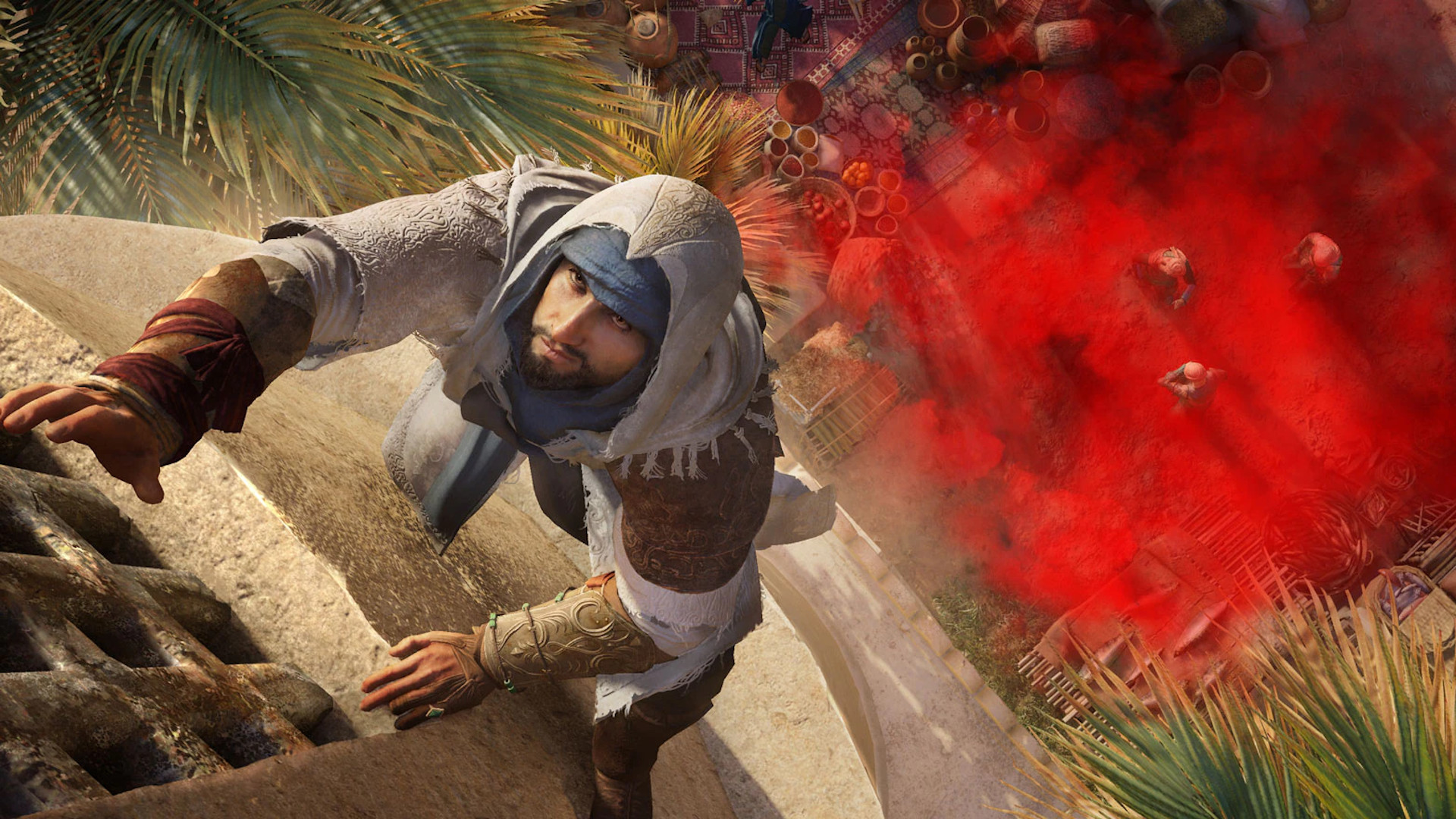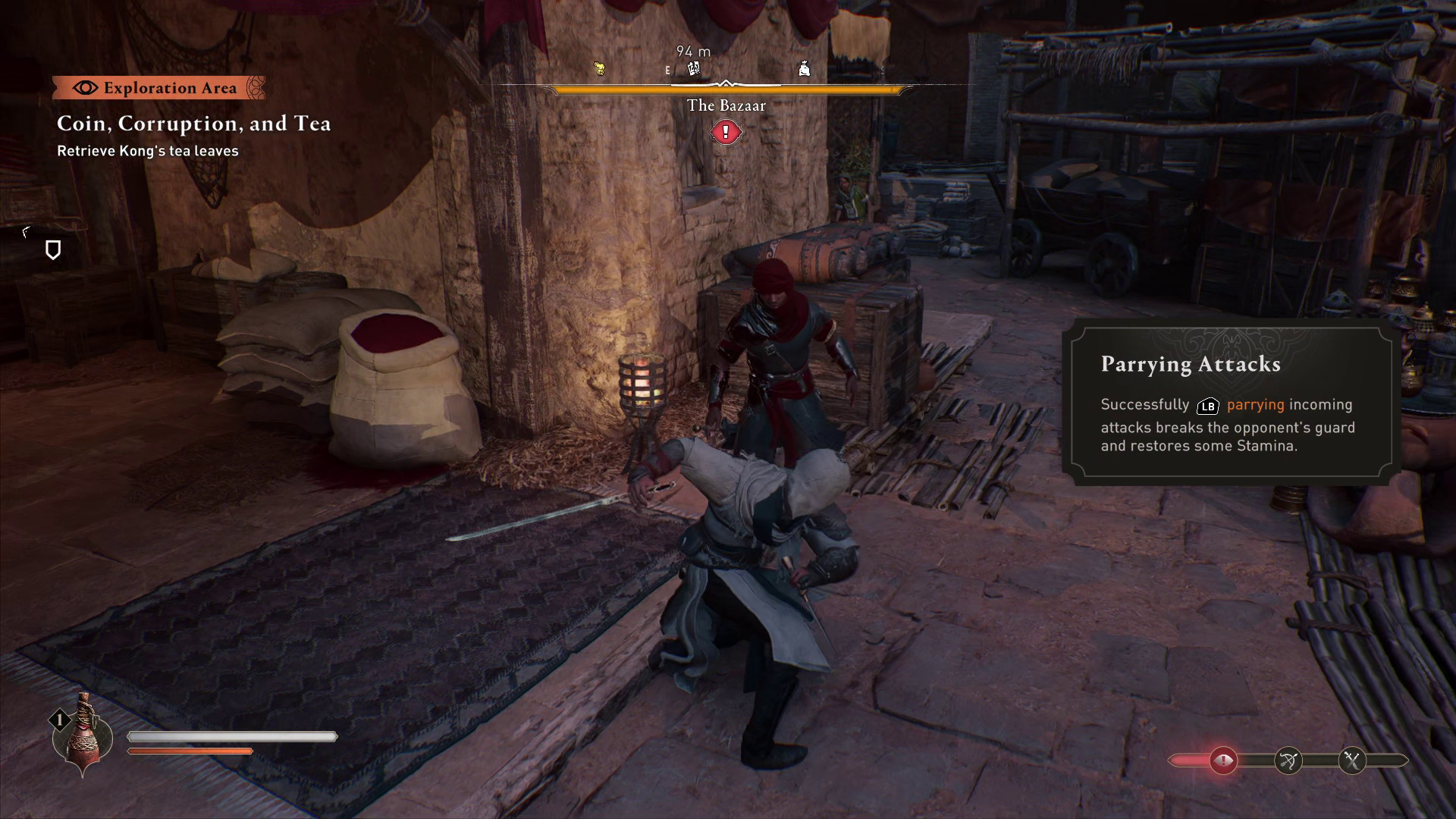I played Assassin's Creed Mirage, and it really is a throwback to the best of the series
Two hours with Ubisoft's love letter to classic Assassin's Creed.

And there he was: the harbormaster I'd snuck through two different compounds to find. Killing this jerk was a big chunk of my two hours with Assassin's Creed Mirage, and I was proud of the route I'd taken to end up high on a ledge with the "assassinate" prompt above his head. My reward was a clean kill: an air assassination ripped straight out of every Assassin's Creed trailer ever. Of course, it wasn't until I stood up from his corpse that I noticed a guard gasping in horror a few feet away.
I made a dash for an exit, lept to the next building, then Basim promptly jumped to a different place than I was aiming for. That's alright, I'd been here hundreds of times before: I adopted the new path, broke line-of-sight by darting down an alley, and found a bench to blend in until they were gone.
I don't mean to get ahead of myself, but I think Assassin's Creed is back, baby.
Old tricks
As a fan of classic Assassin's Creed who felt left behind by the series' transformation into loot-driven RPGs, I'm still reeling from a few hours with Mirage. All of that talk about making a throwback AC game that prioritizes stealth and climbing over swordfighting and horseback riding wasn't just lip service—Mirage moves like an Ezio-era AC game with modern improvements. Rooftops are Basim's home turf, guards die to a hidden blade regardless of level, and swordfights can end with a single counter-attack.
Assassin's Creed Mirage"
A few other observations from my demo that may interest longtime fans:
- Mirage feels like classic AC, but controls like Valhalla: you can run without holding a trigger, combat has the same Souls-like button scheme as Valhalla (light, heavy, dodge), and Basim can pivot his feet on a dime
- Notoriety is back: My scrap with the harbormaster left me with a notoriety status that made guards more attentive, but I was able to tear down wanted posters to clear my name like it was 2009
- Pickpocketing, too: Just about anyone can be pickpocketed, but there's a quick minigame to pull it off
- There's a crouch button: Newer AC games have this, but most of the old ones didn't. I like it as both a useful tool against guards at your elevation, but they won't instantly notice a standing Basim on a roof above them (a great touch, because who wants to crouch all the time?)
- Climbing is realistic again: The AC RPGs had a simplified version of climbing where you could grip onto basically anything. Mirage goes back to the old style, where you have to steer your way across handholds
In the right light, Mirage could be mistaken for a next-gen remake of Assassin's Creed 1. I'm glad it's not, though, because I'm already smitten with Mirage's Animus avatar, the cool-but-kind Basim (last seen in AC Valhalla), and Ubisoft's gorgeous rendering of 9th-century Baghdad.
The city's golden-crisp sunshine, bustling markets, and vibrant decoration reads like a deliberate counterexample to the studio's cold, dour depiction of 12th-century Israel from 2007. Where AC1 showed off its crowd tech by letting Altair shove poor people out of his way, Mirage demonstrates attention to detail in the way vendors set up their stalls for business, friends hold picnics in rooftop gardens, and passersby have full conversations in Arabic. Minus the oppressive occupation by "The Order of the Ancients" (what they call the Templars in AC lore before they adopted that name), Baghdad is the series' most lively city since AC Brotherhood's Rome.
Keep up to date with the most important stories and the best deals, as picked by the PC Gamer team.
Assassin's Creed Mirage - Bazaar"
Getting around
It feels great to be back in an urban jungle, too. Buildings are densely packed with highways of awnings, clotheslines, and support beams for Basim's crossing. Ubisoft hasn't put together a city like this since 2015's Assassin's Creed Syndicate—even that rendering of Victorian London was so spread out that its protagonists needed a wrist-mounted zipline gun to get around—but navigating Baghdad is so natural that you'd think they never took an eight-year break. My long-atrophied parkour muscle reactivated in a matter of minutes, reading lines across rooftops and alleyways like I used to, and frequently surprised by new maneuvers that reduce friction in places that'd kill momentum in past games. Pole vaults placed between larger gaps offer a quicker route than long jumping into the side of a building, and smoother vault animations over waist-high obstructions mean you can sprint through market streets without the constant threat of snagging on a cart or table.
That's not at all to say Assassin's Creed has finally solved its climbing problems. Mirage is so faithful to the classic games that I ran into old jank, too—my Basim took a few leaps in a different direction than I intended, occasionally started scaling a building I was only trying to run next to, and I grappled with a camera that doesn't know what to do when the action moves indoors.
I'm reporting these issues because I figured you'd like to know about them, but if I'm being honest with myself, they didn't really bother me. I should be irked that freerunning has gotten only moderately easier across 15 years of Assassin's Creed, but in fact, the hitches were strangely comforting in this two-hour burst—like running into an old friend who used to annoy me, but now just reminds me fun times. Does it make sense to be nostalgic for jank? One to ponder later.

Missions
One area of Mirage that has come a long way since Syndicate is its encounter design. While the two main contracts I played in my preview session were assassinations, both required an investigation to figure out the target's identity or location first.
The main story mission I played was mostly snooping, in fact. Basim infiltrates a grand auction to bid on an item that'll grant him access to the target. I didn't have enough money to actually win the bid, so I had to steal it from the guy who bought it.
In an earlier instance, I wasn't given a specific location for a mission, just a hint that it was "a warehouse somewhere east of here with red banners and cranes." This is one carryover from AC Odyssey that I adore. Interpreting directions instead of following a waypoint not only gave me a good reason to use the on-screen compass and scout with my eagle, it encouraged me to learn Baghdad's main roads and major landmarks like I would in an actual city. On top of that, I decided to bribe a merchant with a special coin earned from side contracts to get an even more detailed description: "Follow the road, cross the bridge on the right. You'll see the warehouse on your left, past the river."
The only catch was that, in this particular instance, the directions were so good that it didn't take long to spot the only building with red banners and cranes to the east. And that merchant hint? For some reason it also went ahead and gave me a hard waypoint to find the location. Boo!
Still, consider me impressed that the series that once encompassed gaming's excessive use of waypoints and handholding is experimenting with wayfinding as gameplay. I hope the rest of Mirage has more opportunities like this (and I hope they're way harder).
Assassin's Creed Mirage - Stealth Kill"
A fine point
Ubi has upped its stealth game, too. The old AC games' idea of stealth was to place pairs of stationary guards between you and your goal, like bowling pins that have to be knocked down one way or another. My early Mirage missions were different: guards took long patrol routes, left openings to slip by unnoticed, and sometimes dropped clues in idle chatter.
Basim's expanded toolkit is almost entirely focused on remaining undetected: throwing knives, noisemakers, smoke bombs, and most of all Basim's eagle. If this sounds familiar to another Ubi stealth action series, it's because there's a lot of Watch Dogs in Mirage, as well as—if I dare stretch the Ubi legacy a bit further—glimpses of classic Splinter Cell.
Basim and Sam Fisher have at least one thing in common for sure: low constitution. Ubi describes Basim as a "glass cannon" that can go down in just a few hits. I can back that up with how quickly I burned through my medicine pouch after only two combats. This is a big deal for an Assassin's Creed game, because for how much they're associated with stealth, it was always a lot easier (and sometimes more fun) to draw your sword and cut down fifteen guards in a single showdown. Ubi says this approach probably won't work in Mirage, but enemies aren't damage sponges like they are in Valhalla, either: you can counter-kill guards with a single move just like the old games, though the timing is a little tighter than I remember.
Ubisoft's curated tour of early-to-mid-game missions hit its target: I'm excited for Assassin's Creed Mirage, probably more than all the other promising games still to come in 2023. Whether or not it'll all come together is a big question, though. There's a lot of the game I didn't touch: I didn't have time to wander around doing side missions, upgrade gear, or experiment with Mirage's three skill trees. That kind of stuff is the glue that holds these games together, and even a great parkour playground will go wasted without a fun story.
It sounds like Mirage won't be bloated, at least: Ubi says a playthrough will clock in at 20-30 hours. A leaner open world game is sounding pretty good after a Baldur's Gate 3 and Starfield doubleheader.

Morgan has been writing for PC Gamer since 2018, first as a freelancer and currently as a staff writer. He has also appeared on Polygon, Kotaku, Fanbyte, and PCGamesN. Before freelancing, he spent most of high school and all of college writing at small gaming sites that didn't pay him. He's very happy to have a real job now. Morgan is a beat writer following the latest and greatest shooters and the communities that play them. He also writes general news, reviews, features, the occasional guide, and bad jokes in Slack. Twist his arm, and he'll even write about a boring strategy game. Please don't, though.

